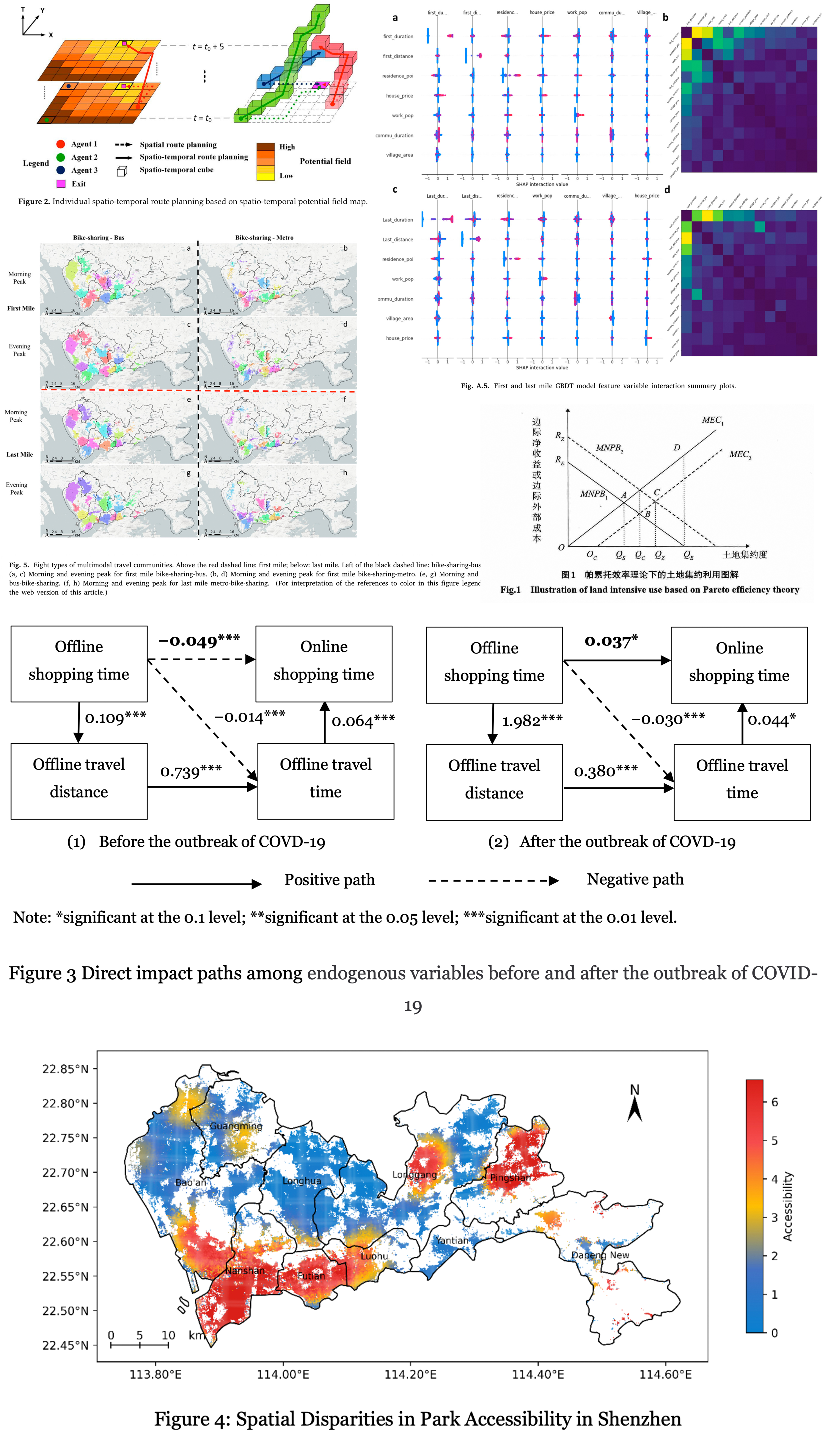Topic 3
Individual Behavior, Built Environment, and Sustainable Development
Research Question:
This research investigates how individual behaviors interact with the built environment to influence sustainable development. The key questions addressed are: How do various elements of the built environment, such as multimodal transport systems and urban land use, impact individual daily activities? Additionally, how can urban planning and design enhance sustainability by influencing these behaviors?
My Work:
My research focuses on examining the intricate relationships between individual behavior patterns and their environmental contexts, emphasizing sustainable urban development. Through detailed analyses of multimodal transportation systems, urban land use intensity, and green space accessibility, I aim to propose strategies that not only enhance the efficiency and equity of urban systems but also foster environmental sustainability. My work leverages large-scale data sets, including mobile phone signaling data and geospatial information, to provide empirical insights into how built environments shape and are shaped by individual and collective behaviors
Research Methods:
-
Data-Driven Analysis of Multimodal Transportation: Utilizing mobile phone location data and bike-sharing trip records, I assess the effectiveness of multimodal transport systems in improving urban accessibility and sustainability. This method helps in understanding the role of bike-sharing in complementing public transit systems, particularly focusing on its efficiency and equity impacts.
-
Spatio-Temporal Cognitive Framework: Employing a novel framework that integrates multiple spatio-temporal scales to analyze individual route choices during outdoor evacuations. This approach includes developing a spatio-temporal A* algorithm to optimize route planning based on individual cognitive processes and agent-based simulations.
-
Sustainable Urban Land Use Analysis: Applying modifications to traditional land intensive use evaluations to explore the temporal and spatial characteristics of urban land use and its sustainability factors. This includes using models like the DPCSIR framework and econometric methods to understand how land use influences economic, social, and environmental outcomes.
-
Evaluation of Green Space Accessibility: Analyzing the accessibility and equity of urban parks using the TB-i2SFCA model and SHAP values. This method evaluates how well different urban and peri-urban areas are served by green spaces, focusing on equity across various demographic groups.
-
Behavioral Impact Assessment: Investigating the changing dynamics of online and offline shopping behaviors and their relationship with travel patterns before and after significant disruptions like the COVID-19 pandemic. This analysis helps to understand how external shocks affect individual behavior and urban mobility.
Several selected studies include:
-
Liu, Z.*, Fang, C., Li, H., Wu, J., Zhou, L., & Werner, M. (2024). Efficiency and equality of the multimodal travel between public transit and bike-sharing account for multiscale. Sustainable Cities and Society, 101, 105096. https://doi.org/10.1016/j.scs.2023.105096
-
Gao, F., Du, Z.*, Fang, C., Zhou, L., Werner, M. (2022). A spatial-temporal cognitive framework for individual route choice in evacuation scenario. ISPRS International Journal of Geo-Information,11,605. https://doi.org/10.3390/ijgi11120605
-
Ma, X., Zhou, L., Zhao. A.* (2014). Sustainable Urban Land Intensive Use Evaluation and Its Impacting Factors——A Modification of Traditional Land Intensive Use. China Land Sciences, 12:32-38. https://doi.org/10.13708/j.cnki.cn11-2640.2014.12.005
-
Zhou, L.* (2014). Spatial and Temporal Differences Analysis of Urban Land Intensive Use Based on ‘Land Consumption’ Index—A Case Study of Main Functional-oriented zones [J]. Journal of Anhui Agricultural Sciences, 24:8374-8376.
-
Zhou, L.* (2014). Effects of Economic Development Level on Agricultural Plastic Film Pollution Treatment [J]. Journalof Anhui Agricultural Sciences, 19:6353-6355.https://doi.org/10.13989/j.cnki.0517-6611.2014.19.089
-
Zhang, W., Geng, Y., Zhou, L., Fang, C.* Associations between online and offline shopping and travel behaviors before and after the outbreak of COVID-19. (the 2nd round revision to Transportation Research Part A).
-
Fang, C., Liu, S., Zhou, L.* ,Silva, E. Measuring Accessibility and Equity of Residential Parks and Green Spaces Under Residential Space Differentiation Based on TB-i2SFCA and SHAP. (ongoing)

